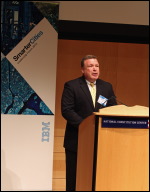
In June, IBM was host to 150 academic, business and government leaders in the region for its Smarter Cities event, a discussion of how technology will play a role in Philadelphia’s future.
As IBM spokesperson Michael Rowinski wrote of the event for us, an important focus of the event — and Philly’s technology investment — is in encouragement of youth technology education and the development of skilled workers from communities throughout the city.
And for all that it’s looking into the city’s future, IBM has had a large presence here, providing significant resources to key community programs, for decades.
Local leaders at the corporation have been involved with the Center for Literacy, Philadelphia Mural Arts Program, the city prison system, School District of Philadelphia, Minority Enterprise Develpment and more. Most significantly, IBM has donated $3.5 million in equipment, software and education to the School District of Philadelphia since 1995.
It’s goal? To help create the next-generation workforce at the well-known corporation.
After the event, we spoke to Ed Quinn, IBM’s Philadelphia Senior Location Executive, in charge of community outreach in the region. Our Q&A with Quinn, after the jump.
 What’s your background? How did you get involved with the company?
What’s your background? How did you get involved with the company?
I grew up in Philadelphia. Went to La Salle College High School, Temple University and Drexel University. I was involved with technology at an early age. I got into IBM in 1989 doing systems development and database development and got into the application layer. I worked all over the U.S.
Now, I’m very heavily involved with IBM’s financial services and in Philadelphia my responsibility is outreach the business leaders. We have a model that’s industry-driven as well as geographically-driven. At Temple, I’m an advocate for the university within IBM, involved with Fox School around some of the technology.
IBM’s partnership with the School District of Philadelphia began a decade and a half ago and has included $3.5 million donations. What kind of measurable impact have you seen from that partnership?
A prior chairman had selected them as one of the places that we would invest technology resources and people. We built out technology programs for people at a higher level. We also help with adult literacy, helping them use computers and technology. Certainly, reinventing education is a key strategy of IBM over the last 15 years. The school district has been a flagship.
The organization is very involved in philanthropic ventures around the region, helping at Mural Arts and with the Philadelphia Prison System – how does IBM’s mission – and technology in general – play into those partnerships?
The reality is that as a business we live, work and invest in the community to build next generation of leaders at IBM. We’ve done it for close to 100 years. That’s been our strategy all along. I think as more technology companies get involved in the community, the community will reflect this as a technology center.
How large is IBM’s presence in the Philadelphia region?
I think we’re one of the largest secret force of people. We represent well over 1,500 people in the area. We are looking to expand that base of work – our population is big, but it’s pretty diverse in what roles we play here. What makes this group unique is our involvement with the volunteer programs and outreach in the city. We run things that are much more geared toward improving the environment around us. In comparison, when I worked in New York, everybody is from somewhere else. [In Philadelphia,] there’s an ownership of civic pride.
Tell us about IBM’s Smarter Cities initiative, hosted here in May.
IBM spends about $5 billion a year on research and as we start to look at trends, there’s ubiquity of technology. You look at things like developing roads, redeveloping infrastructure—it can’t be this hard.
In Philadelphia, [I-95], built in the 50s, it was obsolete before it was done. They didn’t understand the population shift to the suburbs. Now, that kind of knowledge is out there when we look at where the world is going.
Philadelphia is often criticized as slow moving when it comes to technology. Why do you think that it is behind the curve?
I view it as the opposite. I think its an untapped resource. I spend a lot of time in New York, Boston. They’re monolithic in what they do. Philadelphia’s business base is so diverse there’s no one dominant industry. Look at the strengths of location, skills, cost of doing business. There are some favorable costs of doing business here.
Join our growing Slack community
Join 5,000 tech professionals and entrepreneurs in our community Slack today!
Donate to the Journalism Fund
Your support powers our independent journalism. Unlike most business-media outlets, we don’t have a paywall. Instead, we count on your personal and organizational contributions.




